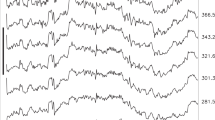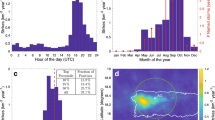Abstract
IT is well known that the ionospheric spread-F condition is extremely common at night in equatorial regions. At Ibadan, Nigeria (latitude 7½°N.), this has been especially so during the past 2½ years of high sunspot activity. It is believed that the same irregularities which produce the wide spread of scattered echoes from the F-region are also responsible for the scintillations of radio stars1 and perhaps for the rapid ‘flutter’ fading2 often observed in shortwave radio reception in equatorial regions.
This is a preview of subscription content, access via your institution
Access options
Subscribe to this journal
Receive 51 print issues and online access
$199.00 per year
only $3.90 per issue
Buy this article
- Purchase on Springer Link
- Instant access to full article PDF
Prices may be subject to local taxes which are calculated during checkout
Similar content being viewed by others
References
Wright, R. W., Koster, J. R., and Skinner, N. J., J. Atmos. Terr. Phys., 8, 240 (1956).
Osborne, B. W., J. Atmos. Terr. Phys., 2, 66 (1952).
Author information
Authors and Affiliations
Rights and permissions
About this article
Cite this article
LYON, A., SKINNER, N. & WRIGHT, R. Equatorial Spread-F and Magnetic Activity. Nature 181, 1724–1725 (1958). https://doi.org/10.1038/1811724a0
Issue Date:
DOI: https://doi.org/10.1038/1811724a0
This article is cited by
-
Equatorial Spread-F and F-Layer Heights
Nature (1960)
-
Spread-F in the ionosphere over ahmedabad during the years 1954–57
Proceedings of the Indian Academy of Sciences - Section A (1959)
Comments
By submitting a comment you agree to abide by our Terms and Community Guidelines. If you find something abusive or that does not comply with our terms or guidelines please flag it as inappropriate.



